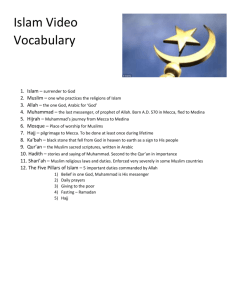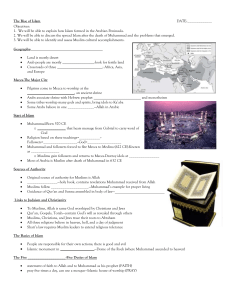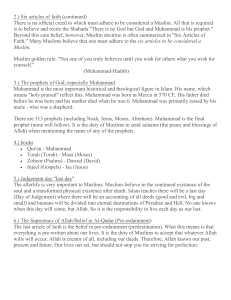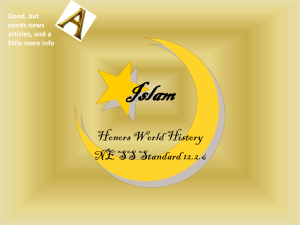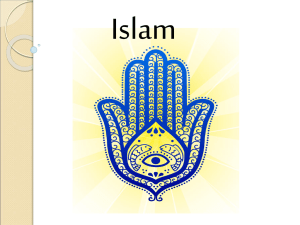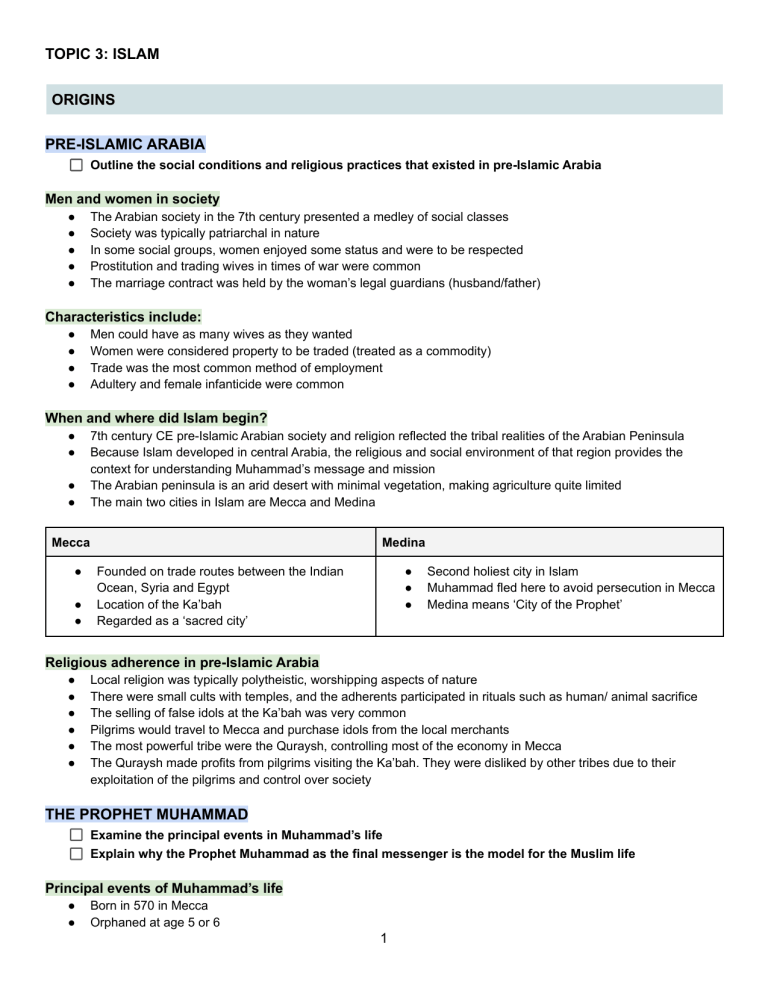
TOPIC 3: ISLAM ORIGINS PRE-ISLAMIC ARABIA Outline the social conditions and religious practices that existed in pre-Islamic Arabia Men and women in society ● ● ● ● ● The Arabian society in the 7th century presented a medley of social classes Society was typically patriarchal in nature In some social groups, women enjoyed some status and were to be respected Prostitution and trading wives in times of war were common The marriage contract was held by the woman’s legal guardians (husband/father) Characteristics include: ● ● ● ● Men could have as many wives as they wanted Women were considered property to be traded (treated as a commodity) Trade was the most common method of employment Adultery and female infanticide were common When and where did Islam begin? ● ● ● ● 7th century CE pre-Islamic Arabian society and religion reflected the tribal realities of the Arabian Peninsula Because Islam developed in central Arabia, the religious and social environment of that region provides the context for understanding Muhammad’s message and mission The Arabian peninsula is an arid desert with minimal vegetation, making agriculture quite limited The main two cities in Islam are Mecca and Medina Mecca ● ● ● Medina Founded on trade routes between the Indian Ocean, Syria and Egypt Location of the Ka’bah Regarded as a ‘sacred city’ ● ● ● Second holiest city in Islam Muhammad fled here to avoid persecution in Mecca Medina means ‘City of the Prophet’ Religious adherence in pre-Islamic Arabia ● ● ● ● ● ● Local religion was typically polytheistic, worshipping aspects of nature There were small cults with temples, and the adherents participated in rituals such as human/ animal sacrifice The selling of false idols at the Ka’bah was very common Pilgrims would travel to Mecca and purchase idols from the local merchants The most powerful tribe were the Quraysh, controlling most of the economy in Mecca The Quraysh made profits from pilgrims visiting the Ka’bah. They were disliked by other tribes due to their exploitation of the pilgrims and control over society THE PROPHET MUHAMMAD Examine the principal events in Muhammad’s life Explain why the Prophet Muhammad as the final messenger is the model for the Muslim life Principal events of Muhammad’s life ● ● Born in 570 in Mecca Orphaned at age 5 or 6 1 ● ● ● ● ● ● ● ● ● ● ● ● ● ● ● Goes to live with Uncle Abu Talib Becomes a trader in his teenage years Khadijah hires him to lead her caravan Married at age 25 Has 6 children - 2 boys and 4 girls Muhammad begins meditating in a cave at Mount Hira The angel Jibril appears to him at age 40 Muhammad starts to tranfer these relevations into writing in the Qur’an New muslims are persecuted in Mecca by the Quraysh because Muhammad’s techings threaten their pagan way of life In the Year of Sorrows, Khadijah and Muhammad’s uncle, Abu Talib both passed away Muhammad ascends to heaven where he speaks to Allah, who gives him instructions to take back to the faithful on earth about the number of times to pray each day Muhammad moves to Medina where he becomes a well-respected community leader and establishes the first planned community of Islam Long war follows until Muhammad’s army finally conquers Mecca Muhammad spares the conquered army, re-dedicates the Ka’ba and Islam is finally accepted Muhammad dies on June 8 632 and is buried in Mecca Role Model ● ● ● ● ● ● ● Revered as the ideal religious and political leader, loyal friend, husband and father Chosen as a prophet by Allah to convey the message of Islam A fearless preacher and warrior for Allah and Islam All Muslims are encouraged to follow his example in living Islam and perfecting their character Inspired extraordinary confidence and commitment Practices of the prophet became the guiding source of Islamic law alongside the Qur’an Muslims look to Muhammad’s example for guidance in all aspects of life - how to treat friends as well as enemies; what to eat and drink, how to love and conduct war (1) Personal qualities: - Honest, loyal and faithful as a trader and husband - Muslims look to Muhammad’s example for guidance in all aspects of life - how to treat friends well as enemies, how to love and conduct war - In 622, Muhammad remained in Media and built the first Muslim community and gathered more poeple by his side - This displays his loyalty and generosity towards his religion and his believers (2) Social, political reformer who cared for the poor, abolished slavery and infanticide and improved conditiosn for women - Quran - “and whatever you end he will replace it and he is the best of the providers” - Under Muhammad’s guidance, he advises the Muslims to spend for the welfare of the general public - This quality makes him stand out as a role model of ideal personhood for Muslims (3) - Muhammad was a man of prayer and spiritual searcher who was close to Allah before the revelations began He was roughly 40, having visions and hearing voices An angel, Jibril appeared and instructed him to recite “in the name of (your) lord” Having a strong connection with Muslim prayer and spirits leads Muslims to follow his directions, making hima great role model Character ● ● ● Honest and integrity as a trader Loyal and faithful husband and father Man of prayer, spiritual searcher - close to Allah before the revelations began 2 ● ● ● Strong leader and statesman Arbitrator and judge, resolving dispute justly, ensuring fair wages and no corruption Social, political reformer - cared for the poor, abolished slavery and improved conditions for women Scripture References: ● ● “The pursuit of knowledge is obligatory on every Muslim” (Hadith) “How perfect Allah is and I praise him” (Sunna) DEVELOPMENT OF ISLAM UNDER THE LEADERSHIP OF THE RIGHT CALIPHS Describe the development of Islam after the death of Muhammad under the leadership of the Four Rightly Guided Caliphs, accounting for the emergence of the Sunni and Shi’a Origin and role of a caliph ● ● ● When Muhammad died in the 11th century CE, people were plunged into a political crisis Decision was made that Islam should be led by a ‘king’, who had a strong relationship with Muhammad For the next 30 years after Muhammad’s death, the Islamic world was ruled by 4 caliphs whose role was to promote Islam and ensure its long-term survival in the wider community Caliph had multiple roles in the early life of Islam: ● Make laws based on the Qur’an ● Lead the Muslim community (umma) ● Responsible for creating and maintaining a way of life where Muslims could live according to key Islamic principles The four ‘rightly guided’ caliphs The four caliphs were: ● Abu Bakr (632-634) ● Umar (634-644) ● Uthman (644-656) ● Ali (656-661) Abu Bakr (632-634) ● ● ● ● ● ● Father of Aisha, Muhmammad’s wife Very wealthy and put much of his fortune towards building the Muslim community One of Muhammad’s most trusted friends for many years Acknowledged as Muhammad’s successor by the Prophet’s companions Pacified and united the Muslim tribes Ordered the first collection of the written text of the Qur’an Contributions to early Islam: ● Restored stability to a community in turmoil following Muhammad’s death ● Initiated the process of compiling the Qur’an in written form ● Managed to strengthen and consolidate the community and the state Umar (634-644) ● ● ● ● ● Early follower of the Prophet He was the designated nominee for succession to Abu Bakr, a member of the Quraysh clan and father of Muhammad’s wife Hafsa Ruled for 10 years until he was assassinated in 644 CE Death was a reflection of the political instability and risks during the period following Muhammad’s death Famously conquered Jerusalem during his reign as caliph 3 Contributions to early Islam: ● Extended the Muslim empire to Palestine, Syria, Egypt, Iraq, Persia and Armenia ● Effective military leader ● Famous conquest - Jerusalem (site of religious significance for monotheistic religions) ● Appointed a committee to choose the next caliph Uthman (644-656) ● ● ● ● ● One of six appointed by Umar to be a successor to him after his death Ideal successor (Ali) refused several terms of the caliphate, so the role was given to Umar Accused of nepotism by distributing wealth and land to his family Management of Egypt was harsh and unreasonable, creating many enemies Lead to his murder by Egyptian assassins in 656 CE Contribution to early Islam: ● First six years of his caliphate focused on promoting peace ● Extended empire to Libya and Eastern Europe ● Qur’an was completed during his reign Ali (656-661CE) ● ● ● ● ● ● After declining the leadership position before Uthman’s reign, Ali moved into power as the final caliph Married Muhammad’s daughter Fatima and had been close to Muhammad for almost 30 years Decision to select Ali was not unanimous, and this created great tensions amongst the Muslim community During his leadership, there was a civil war and great political upheaval, leading to his assassinations in 661 CE Following his death, Muawiya was selected as the next caliph By this stage there was a significant division in allegiances, and the caliphs that followed were not considered part of the four rightly guided caliphs Sunni and Shi’ite ● ● ● Two variants of Islam emerged as a result of the disagreement around who should be selected as leader of the Muslim community Choice of Muawiya after Ali’s assassination was the trigger that led to the schism in Islam Lead to the formation of two key variants in Islam, Sunni and Shi’a Sunni ● ● 90% of Muslims Leader should be chosen from descendants of tribe of Muhammad, but not necessarily his family Shi’a ● ● ● ● 10% of Muslims Leader must be a descendant of Muhammad Imam - rightful leader Believed the final imam vanished without dying, and will appear to Muslims in times of need PRINCIPAL BELIEFS Core Beliefs Outline the implications of Tawhid for Muslim belief Examine the role of the Books of Allah and the prophecy in Islam Outline the principal beliefs about Angels, life after death and fate/predestination ● Six beliefs all centre around the belief in one God, promoting the importance of monotheism and worship of Allah 4 ● ● ● ● ● ● Tawhid - belief in one God Books of Allah - sacred texts in Islam Rusul - prophets of Islam which includes Muhammad, Jesus and Abraham Akhira - Judgement Day and afterlife Fate/Predestination - destiny and fate in Islam Angels - role of Angels in delivering Allah’s message Implications of Tawhid ● ● ● ● ● ● ● Belief in the immanent and transcendent Allah Reflected in the quote from the Qur’an - “He is Allah, the One, Allah is Eternal and Absolute” (Surah 112) Muslims are called to put their trust into the love and compassion of Allah to all living creatures Muslims are not to be proud or arrogant Muslims should worship Allah alone - no one else is worthy of worship It is forbidden to represent Allah in visual or symbolic form Scripture References: “He is Allah, the One, Allah is Eternal and Absolute” (Surah 112) Rusul (Prophets) ● ● ● ● ● ● ● ● ● ● Prophet = someone through whom Allah speaks Rusul = prophet who has delivered a holy book Nabi = refers to an inspired prophet of Allah who has not been given a specific purpose Muslims believed in many Rusuls: Noah, Abraham, Moses, Jesus and Muhammad Five prophets are considered the most important - they received special revelations and performed their work Refers to the chosen messengers by Allah to reveal God’s teachings to humankind Muhammad is Allah’s last prophet who brought the final message that has been preserved in the Qu’ran Messenger given a particular mission by Allah to pass onto faithful adherents Adam - first prophet of Islam; belief that is shared with the other monothesic religions; Judaism and Christianity Scripture References: “Who can be better in faith than one who submits his whole self to Allah” (Surah 4:125) The Books of Allah ● ● ● ● ● ● ● Books of Allah = revealed books of the Rusul Muslims believe that over time, many of these books have not been properly preserved No longer faithfully represent the messages of Allah Torah and Bible are still respected by Muslims adherents They have been altered from their original form and cannot be relied upon as the literal words of Allah The Qur’an is the last of the revealed books - complete and reliable source of revelation of Allah Scripture Reference: “Believe in what has been sent down to thee Muhammad and what has been sent down before thee” (Surah 2:4) The existence of angels ● ● ● ● ● ● They carry the sacred message of Allah to the prophets Allah presents his revelations through the angels, who then pass on these important messages to the prophets Witness God’s creative glory in the universe and express absolute praise, service and obedience to God Each person has two guardian angels who record their good and bad deeds These angels are acknowledged during daily salat where an adherent turns to the right and then the left to bless the angels guiding them through life Number of angels referred in the Qur’an: ○ Jibril = greatest of all of God’s angels as he was the vehicle for the revelation of the Qur’an ○ Iblis = former angel who became the devil ○ Jinn = led by Iblis and can be associated with evil ○ Aza’i = adherent just before their death to receive their soul as it leaves their body ○ Israfi = souls on the Day of Judgement ○ Mika’il = guards places of worship and its worshipper 5 ● Scripture Reference: “Praise be to Allah, who created the heavens and the earth” (Surah 35:1) Resurrection and life after death (Akhira) ● ● ● ● ● ● ● ● ● ● Akhira = arabic term for final or last Life is split into two parts: mortal and afterlife Mortal life tests adherent’s ability to overcome the challenges of life and submit to the will of Allah Allah knows the past and future actions of very person The Qu’ran states for each person after death, there is an intermediate period where souls wait for resurrection Every human who has ever lived will be rewarded for their goodness or punished for their sins The only sin that will not be forgiven by Allah is the deliberate worship of other gods Muslim’s salvation is earnt through the trials and challenges they experience throughout their lives People fail the judgement test, they enter Jahannam (Hell) - portrayed as a place of fire, hot winds and tortue, without Allah’s love Scripture Reference: “One-burdened soul shall not bear the burden of another” (Surah 35:18) Fate and predestination ● ● ● ● ● ● ● Muslims are given free will - whether or not they submit to the will of Allah It influences their fate in the next life Happens by design with a specific purpose by Allah Muslims do not believe in absolute predestination since they consider it incompatible with God’s justice Allah already knows our destiny in life Allah is the only source of guidance in life Scripture Reference: “No calamity befalls on the earth or in yourselves but is inscribed in the Book of Decrees” (Surah 57:22) SACRED TEXTS AND WRITINGS - Identify the importance of: The Qur’an The Hadith Examine extracts from the Qur’an and Hadith which demonstrates the principal beliefs of Islam What is the Qur’an? ● ● ● Fundamental text for Muslims All Muslims, regardless of their national language, memorise and recite the Qur’an in Arabic Comprised of 114 surahs Rules when reading from the Qur’an ● ● ● ● ● Literal words of Allah - must be respected No food or drink to be consumed whilst reading the Qur’an Before reading, the adherent needs to bathe with an appropriate attitude before reading the text Women can’t read from the Qur’an during their monthly period Need to be left in an elevated position protected with a sheet when not in use Importance of the Qur’an ● ● ● ● ● ● Considered the most holy book among Muslims Contain the literal words of Allah, which was passed onto Muhammad through the angels Provides guidance in leading to spiritual and somatic health for the individual People who have committed the entire Qur’an to memory are honoured by their communities - known as Hafiz Considered an honor to produce a copy of the Qur’an - written in beautiful calligraphy Central message revolves around the Day of Judgement - faithful will receive a life of happiness while evil will experience harshness of the eternal separation 6 Importance of the Hadith ● ● ● ● ● Secondary teachings to the Qur’an as they are the words of a human, not the words of Allah Two types of Hadiths: Prophetic and Sacred Sacred Hadiths are considered to be the most important Most Muslims accept that there are six collections of Hadiths being the most trustworthy Shi’ite Muslims only trust the Hadiths of Ali and Shi’ia imams and have their own five collection Extracts from the Qur’an Akhira “One burdened soul shall not bear the burden of another” (Surah 35:18) Fate/Predestination “No calamity befalls on the earth or in yourself but is inscribed in the Book of Decrees” (Surah 57:22) Book of Allah “Believe in what has been sent down to thee Muhammad and what has been sent down before thee” (Surah 2:4) Angels “Praise to be Allah, who created (out of nothing), the heavens and the earth, who made the angels” (Surah 35:1) Tawhid “He is Allah, the one, Allah is eternal and absolute” (Surah 112) Prophets “Who can be better in faith than one who submits his whole self to Allah” (Surah 4:125) CORE ETHICAL TEACHINGS Outline the principal ethical teachings within Islam Key Definitions: ● Fiqh = Jurisprudence is the system of laws applied in a particular country and is the scholarly interpretation of Shari’ah. ● Shari'ah “the path” = Differs among different Muslim societies, Is enforced both politically and spiritually, among communities and individuals and is devised by a specific process, God’s guidance for happiness in this world and in the next ● Ijma = A process whereby authoritative Muslim jurists come to a consensus as to which of the Hadith can be considered to be authentic sayings of Muhammad, and thus serve as a foundation of Shari’a law. ● Qiyas = Process of analogical reasoning in which the teachings of the Hadith are compared and contrasted with those of the Qur’an. For example, a Muslim may wish to know about cocaine use; although this drug is not mentioned in early Islamic texts, wine is. Wine (alcohol) is prohibited in Islam, therefore based on analogical reasoning, Muslim scholars have declared cocaine to be prohibited. Some Principles of Islamic Jurisprudence - Istihab = a principle of evidence in which a situation or thing known to exist continues to exist until its opposite is proven, such as "innocent until proven guilty" - Ibahah = anything is permitted if it is not expressly prohibite - Bayinah = the burden of proof is on the accuser or the plaintiff, not the defendant 7 There are a number of key sources of Islamic ethics: ● Qur’an: outlines what actions are obligatory - those that are permitted and forbidden ● Hadith and Sunna - secondary importance to the Qur’an, traditions of the prophet Muhammad ● Shariah law - ethical jurisprudence, guides adherents’ daily behaviour and their treatment of others on a wide variety of issues ● Fiqh - theory or philosophy of Islamic law Principal ethical teachings: ● ● ● ● ● ● ● ● ● Submission to Allah: the ultimate goal of the Muslim adherent is to demonstrate belief in Tawhid Taqwa: adherents should strive to make all actions and decisions based on the needs of Allah Striving: adherents are called to ‘strive’ for spiritual perfection thereby living an Allah-centred life Sacred texts: source of divine revelation (Qur’an) and the sayings and teachings of Prophet Muhammad Qiyas: use of an analogy to make ethical decisions Ijma: use of judgement provided by Islamic scholars Ijtihad: personal judgement and reasoning to make a decision Shariah: process of Islamic jurisprudence Equality: the ummah and all equal in the eyes of Allah Muslim Virtues: ● ● ● ● ● Selfishness Naturalness: the natural world was designed by Allah in a particular way Humility Love of Allah: reflects belief in Tawhid Modesty: regards to women and dress What shapes a Muslim’s ethical principles? ● Shariah law = when presented with an ethical dilemma in Islam, adherents can consult a series of sources to guide them in their daily life and decision-making Halal or Haraam: ● ● Halal: permitted under Islamic law - Halal meat, prayer, charity Haraam: forbidden, unlawful and sinful - adultery, Polytheism ISLAMIC JURISPRUDENCE Outline the process of Islamic jurisprudence ● ● ● ● ● ● ● ● ● Shariah law = adherents consult a series of sources to guide them in their daily life and decision-making Ethical teachings of Islam reflects how the beliefs and teachings of Islam influence human behaviour Places very strong emphasis on the importance of right action and the laws that govern actions While the teachings enclosed within the Quran are clear, they can often be quite concise and as such application can become difficult in certain situations ○ Laws about prayer, fasting, almsgiving, pilgrimages ○ Law directly regulates the ways in which human beings treat one another Muslim’s life is guided by Shari’a - ‘path to a waterwhole’ Regulates all aspects of Muslim life: performance of ritual, personal morality, family and inheritance laws Whole life must be one of submission to Allah for happiness in this world Encompasses both public and private life Reflection of Allah’s guidance for Muslims whatever situations they may find themselves in Shi’ia ● Consult mutjahids or ayatollahs when making ethical decisions 8 ● ● Can make itjihad decisions based on their extensive knowledge and analysis of the sacred texts and Islam law Decisions are considered binding in the Shi’ia communities Halal and Haraam ● ● ● When faced with an ethical dilemma, not all equal in terms of their severity Some actions may be considered desirable, whilst others are unethical or immoral When faced with an ethical decision, a Muslim adherent is called to consider these factors: Factors include: ● Respected leaders: typically against an issue, it would be commonly considered haraam ● Precedents: there is a case where something was permitted in a similar circumstance, it will typically be permitted in future, similar circumstances ● Common good: welfare of others and justice is the key concern when making an ethical decision ○ Action may not be considered haraam, it may be considered harmful ● Haraam: forbidden actions which are never permitted eg. murder ● Fard: required actions or behaviours ● Mandub: desirable or commended actions ● Mubah: unclear actions which require personal judgement ● Makruh: actions considered hateful and thus are not commended EXPRESSION OF FAITH Outline each of the five pillars Shahada: Beliefs ● ● ● ● ● Statement made by Muslims about the belief in one God “I bear witness there there is no God but Allah and that Muhammad is his messenger” Foundational concept of being a Muslim Denial of anything that falsely claims to be God Physical sign of the belief in Tawhid (one God) Salat: Prayer ● ● Five daily prayers from sunrise to sunset which can be performed anywhere facing the direction of the Holy Cit Recited in Arabic and accompanied by ritual actions 9 ● ● ● ● ● Before praying, Muslim must enter a state of ritual purity via washing themselves Prayer is on clean ground using a prayer mat and removing your shoes Every Friday, Muslims gather at the mosque at midday Sign of obedience and proclaims oneness to Allah Provides strength to carry out what it means to be a Muslim in everyday life Zakat: Almsgiving ● ● ● ● ● Donate 2.5% of their annual income to charity Money goes to the poor, freeing others from debt and setting people free of slavery Purify and cleanse wealth and allow one to be free of greed and selfishness - lost attachment to money and material possessions Believe all their wealth and possessions belong to Allah, not themselves Give selflessly without telling others how much they have donated Sawm: Fasting ● ● ● ● ● Month of fasting during Ramadan (month when the Quran was revealed to Muhmmad during daylight hours) Requirement for all Muslims once they are a teenager Avoid committing any sins At night, they gather, celebrating with a feast Rewinds Muslims of the realities of poverty Hajj: Pilgrimage ● ● ● ● ● ● Journey to Mecca to retrace the steps of Muhammad and Abraham to achieve spiritual renewal All Muslims must go at least once in their lifetime Commence at the Ka’bah The celebrate is Muslim-exclusive and physically demanding Adherents encircle the Kaba seven times, observe a procession, journey to Mina and then again encircle the Kaba They complete a series of activities including: ○ Tawah - circle the Ka’bah 7 times to symbolise the oneness of Allah ○ Sa’y - run between 2 hill 7 times to demonstrate trust in Allah ○ Stand at Mt Arafat - meditate and ask Allah for forgiveness of their sins ○ Stoning of the Devil of Jamarat - casting away sin and temptation 10

